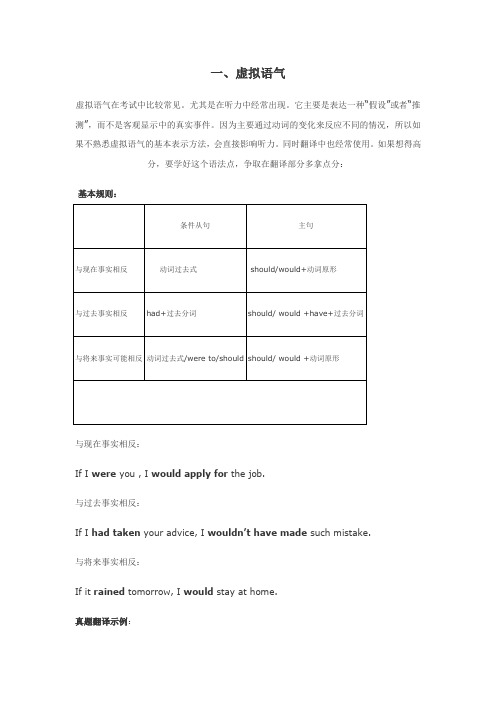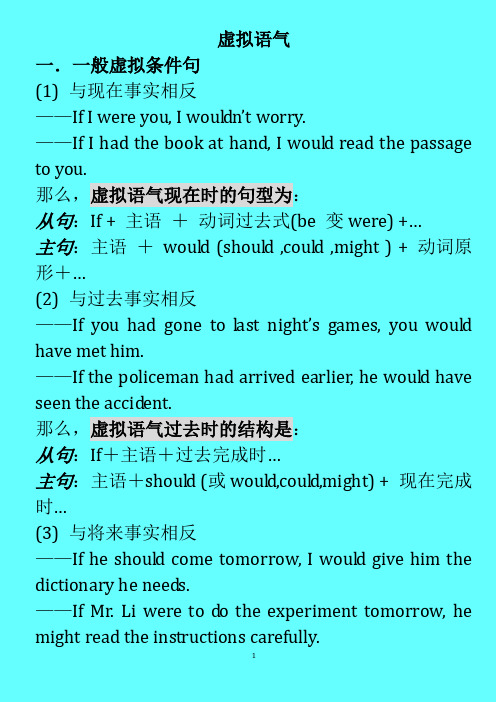英语四级虚拟语气
- 格式:doc
- 大小:47.00 KB
- 文档页数:4

英语作文常用句式一、引出开头1:It is well-known to us that……(我们都知道……)==As far as my knowledge is concerned, …(就我所知…)2:Recently the problem of…… has been brought into focus. == Nowadays there is a growing concern over ……(最近……问题引起了关注)3:Nowadays(overpopulation)has become a problem we have to face.(现今,人口过剩已成为我们不得不面对的问题)4:Internet has been playing an increasingly important role in our day-to-day life. It has brought a lot of benefits but has created some serious problems as well.(互联网已在我们的生活扮演着越来越重要的角色,它给我们带来了许多好处但也产生了一些严重的问题)5:With the rapid development of science and technology,more and more people believe that……(随着科技的迅速发展,越来越多的人认为……)6:It is a common belief that……==It is commonly believed that……(人们一般认为……)7:A lot of people seem to think that……(很多人似乎认为……)8: It is universally acknowledged that + 句子(全世界都知道...)9. Man is now facing a big problem ______ which is becoming more and more serious.人类正面临着一个严重的问题……,这个问题变得越来越严重。

英语四级考试中的虚拟语气英语四级考试中的虚拟语气虚拟语气在宾语从句中的用法是一个常见的考点,我们着重讲一下宾语从句常使用虚拟语气的几类特殊动词,以及这些动词的用法、构成虚拟语气的用法等。
下面是店铺为大家带来的英语四级考试中的虚拟语气,欢迎阅读。
一、何谓虚拟?在英语中,语气(mood)和时态,语态一样,都是谓语动词的一种形式。
表明说话的目的和意图,虚拟语气即表示说话人主观愿望或纯假设情况,动词需用特殊形式。
例如If I were a boy。
其中谓语动词用were,而不是am, shall, was, have等,是因为说话人为女士,而“我是男人”仅是其假设的语气,故用了一个在现实情况中绝不可能用到的were来表达这一虚拟的情况。
通过在I的后面加were这一词,能得知这是虚拟假设出来的情况。
常见的虚拟有两种:1. 表示非真实假设情况:If If I had left sooner, I could have caught the train。
如果早点出发,我就能赶上火车了。
(但我事实上已经错过了,对过去的假设虚拟)He talks so loud as if I were deaf。
他说话声太响,就像我聋了一样。
(但事实我没聋,对现在的假设虚拟)这种情况虚拟时,只需将谓语动词变本身的时态再变过去。
第一句话中的虚拟,本身为过去时,因此再变过去,即过去完成时。
left变为had left, could catch变为could have caught。
第二句话中,as if I am deaf,需要对现在假设,因此变为as if I were a deaf。
(不用I was deaf,避免与真实情况过去式混淆)类似表示非真实情况的`词还有wish希望, suppose假设, would rather宁愿, but for要不是等。
2. 表示建议、命令、要求等主观意愿:He suggested that a petition (should) be drawn up。

一、虚拟语气虚拟语气在考试中比较常见。
尤其是在听力中经常出现。
它主要是表达一种“假设”或者“推测”,而不是客观显示中的真实事件。
因为主要通过动词的变化来反应不同的情况,所以如果不熟悉虚拟语气的基本表示方法,会直接影响听力。
同时翻译中也经常使用。
如果想得高分,要学好这个语法点,争取在翻译部分多拿点分:基本规则:与现在事实相反:If I were you , I would apply for the job.与过去事实相反:If I had taken your advice, I wouldn’t have made such mistake.与将来事实相反:If it rained tomorrow, I would stay at home.真题翻译示例:例1:They requested that _______(我借的书还回图书馆)by next Friday.1. 动词request引导的从句应用虚拟语气2. 虚拟语气的表达方式:should+动词原形,此题则为:should return3. 按句意顺序译,得出答案:I should return the book to library例2:The victim ________(本来有机会活下来)if he had been taken to hospital in time.1. 一看句意有“本来”,十之八九为虚拟语气2. 二看时态推后了,本该过去时,却用过去完成时,因此一定考虚拟3.按句意译为:would have a chance to survive哪些动词及其与他们相关的名词,从句需虚拟语气?一想要(desire)二宁愿(prefer)三命令(order. command)四建议(advice. suggest. propose)五要求(demand. require. request. ask. insist),另加一个wish实战练习:1. It is strange that he _________ so.A. would sayB. would speakC. should sayD. will speak2. My father did not go to New York; the doctor suggested that he _________ there.A. not wentB. won’t goC. not goD. not to go3. I wish that I _________ with you last night.A. wentB. could goC. have goneD. could have gone4. If you had told me in advance, I _________ him at the airport.A. would meetB. would had metC. would have metD. would have meet5. Mike can take his car apart and put it back together again. I certainly wish he _________ me how.A. teachesB. will teachC. has taughtD. would teach6. I enjoyed the movie very much. I wish I _________ the book from which it was made.A. have readB. had readC. should have readD. are reading7. You are late. If you _________ a few minutes earlier, you _________ him.A. come; would meetB. had come; would have metC. come; will meetD. had come; would meet8. If she could sew, _________.A. she make a dressB. she would have made a shirtC. she will make a shirtD. she would had made a coat9. If I _________ you, I _________ more attention to English idioms and phrases.A. was; shall payB. am; will payC. would be; would payD. were; would pay10. Had I known her name, _________A. or does she know mine?B. and where does she live?C. she would be beautiful.D. I would have invited her to lunch.答案及解析:1. C2. C3. D4. C5. D6. B7.B8. B9.D 10. D1. It is strange that是主语从句的虚拟语气,从句用sb. should do的形式。

虚拟语气一.一般虚拟条件句(1) 与现在事实相反——If I were you, I wouldn’t worry.——If I had the book at hand, I would read the passage to you.那么,虚拟语气现在时的句型为:从句:If + 主语+动词过去式(be 变were) +…主句:主语+would (should ,could ,might ) + 动词原形+…(2) 与过去事实相反——If you had gone to last night’s games, you would have met him.——If the policeman had arrived earlier, he would have seen the accident.那么,虚拟语气过去时的结构是:从句:If+主语+过去完成时…主句:主语+should (或would,could,might) + 现在完成时…(3) 与将来事实相反——If he should come tomorrow, I would give him the dictionary he needs.——If Mr. Li were to do the experiment tomorrow, he might read the instructions carefully.那么虚拟语气将来时的句型是:从句:If+主语+should (或were to )+动词原形+…主句:同虚拟语气现在时的主句结构。
练习:1.I f this report were more accurate, it __________ an invaluable document.A.wereB.had beenC.will beD.would be(D)2.I _______ in trouble if the police had stopped me.A.wereB.would have beenC.would beD.had been(B)3.W hat would you do if war _________ out.A.breaksB.could breakC.had broken outD. were to break(D)二、在if引导的虚拟条件句中,若有were, had, should,可省去if,将were, had, should提到主语前,形成倒装。

英语四级听力的特殊疑问句和虚拟语气英语四级听力考试是众多大学生备考的重点之一。
在听力考试中,特殊疑问句和虚拟语气是经常出现的考点。
本文将重点讨论这两个语法知识点,并给出一些实用的技巧和例子。
一、特殊疑问句(Special Interrogative Sentences)特殊疑问句用来询问事物的特定信息,通常以特殊疑问词(如what、when、where、who、whom、whose、which、why、how等)开头。
在英语四级听力中,特殊疑问句经常用于获取听力材料中的关键信息。
1. Wh- 开头的特殊疑问句例如:What is the lecture mainly about?这类特殊疑问句通常用来询问主题、内容以及主要信息。
在听力过程中,应特别关注关键词或短语,以确定正确答案。
2. How 开头的特殊疑问句例如:How does the professor define the term "culture"?这类特殊疑问句通常用来询问方式、方法、定义等。
在听力时需注意关键词或短语的解释或例子,以了解其含义或方式。
二、虚拟语气(Subjunctive Mood)虚拟语气用来表达假设、愿望、建议、命令等非现实或假设情况下的语气。
在英语四级听力中,虚拟语气常常用于听力材料中的对话或信息转述。
1. If / Wish 引导的虚拟语气例如:If I were you, I would take the opportunity.这类虚拟语气用来表达假设、愿望或建议。
在听力中,需要注意对话中的虚拟条件句,并根据语境确定正确的答案。
2. Should / Were 引导的虚拟语气例如:He spoke to me as if I were his best friend.这类虚拟语气用来表达假设、推测或类似情况。
在听力中,需要关注上下文信息,以找到暗示或提示答案的线索。
除了上述考点,英语四级听力还会涉及其他语法知识点和表达方式。

四级语法真题解析虚拟语气解析四级语法真题解析——虚拟语气解析在四级英语考试中,语法是一个重要的考点,而虚拟语气作为其中的一部分,往往会引起考生的困扰。
本篇文章将从真题解析的角度,重点讲解四级考试中常见的虚拟语气用法和解题技巧。
1. 引导条件状语从句的虚拟语气在各类真题中,虚拟语气通常用于条件句中。
在条件句中,如果假设的条件与事实相反或者不可能实现,就要使用虚拟语气来表达。
例如,2019年6月份四级阅读真题中的一道题目是:"If you had learned to play a musical instrument as a child, you _____ playing one now."A. might have enjoyedB. might enjoyC. must have enjoyedD. would enjoy这道题目考察的就是过去的虚拟语气。
根据题意可知,主句中使用的是过去完成时态,在此基础上,我们需要使用与过去相反的虚拟语气形式。
因此,在条件从句中使用过去完成时态的虚拟语气,答案选项为A,即"If you had learned to play a musical instrument as a child, you might have enjoyed playing one now."2. 引导宾语从句的虚拟语气在四级考试中,虚拟语气有时也会用于宾语从句中。
特别是在一些形容情感、命令、建议等动词后面的宾语从句中,常见虚拟语气的运用。
例如,2019年12月份四级阅读真题中的一道题目是:"He recommended that the patient _____."A. sees a specialistB. will see a specialistC. saw a specialistD. see a specialist根据题目可知,主句中使用了虚拟语气动词"recommended",因此在宾语从句中需要使用虚拟语气形式。
4级翻译虚拟语气讲解精选+习题高中语法项目------虚拟语气Subjunctive Mood 一:分类1在英语中有三种语气,陈述语气,祈使语气和虚拟语气2 虚拟语气表示说话的人的一种愿望、意见、命令、要求,有时候是一种非真实的假设、料想或者是不可能实现的与事实相反的愿望。
二、形式虚拟语气经常用在if引导的条件状语从句中,在条件句中做出和事实不相符的一种假设。
a.和现在事实相反的假设If从句主句主语+动词过去式+其它(be动词用were) 主语+would/should/could/might+动词原形+其它如:If I were you, I would study hard. If he had enough money, he would buy a computer.b.和过去事实相反的假设If从句主句主语+had done+其它主语+had been done+其它主语+would/should/could/might +have done主语+would/should/could/might +have been done(被动)如:If you had come five minutes earlier, you would have met him.If they had been treated in time, they would not have died.c.和将来事实相反的假设If从句主句主语+were to do+其它主语+动词过去式+其它主语+should+动词原形+其它主语+would/should/could/might+动词原形如:If I were to do it, I would do it in another day.If it rained tomorrow, we wouldn’t be able to go on picnic.d.混合条件句混合条件句是指条件句是对过去事实相反的假设,而主句则表示现在的某种情况。
虚拟语气
重点,难点导考
1主语从句中的虚拟语气
主语从句中的虚拟语气主要取决于某些形容词和过去分词,用来表示建议、命
It is essential that you (should) win the voters’ hearts.
赢得选民的心是绝对必要的。
It was suggested that he (should ) join the club activities.
有人提议他应该参加俱乐部的活动。
2表语从句和同位语从句中的虚拟语气
在表示建议、命令、主张、目的和愿望等名词后面的表语从句和同位语从句中谓
例如:
He gave orders that the guests (should )be hospitably entertained.
他下命令热情款待这些客人。
His proposal is that we (should) get rid of the bad habits.
他提议我们应该摈弃这些不良习性。
3宾语从句中的虚拟语气
(1)某些动词后所接的宾语从句中谓语动词要求用虚拟语气,用来表示建议、
例如:
He insisted that the meeting be put off
他要求推迟那个会议。
They proposed that all the plans should be discussed at the meeting
他们建议所有的计划都应该在会上讨论。
(2)在以it 为形式主语的复合宾语从句中也用虚拟语气,其形式为:(should)+动词原形。
这一句型中使用的形容词(宾补)与主语从句中的虚拟语气
所使用的形容词一致。
例如:
We think it advisable that he (should) think deeply before acting,
我们认为他在行动之前好好考虑一下才是明智的。
(3)wish 后面所跟的宾语从句中的虚拟语气表示某种不能实现的愿望。
其形式为:
表示对现在情况的虚拟:wish+主语+动词过去式或were
表示对过去情况的虚拟:wish+主语+had+过去分词
表示对将来情况的虚拟:wish+主语+would+动词原形
例如:
I wish I knew what was going to happen
但愿我能知道要发生什么事。
She wished she had stayed at home
她懊悔的是她当时要是在家就好了。
I wish I were rich
我恨不得我很富有。
注:在表示对过去情况的虚拟的时候,有时也用如下形式:
Wish+主语+would(could)+have+过去分词
I wish Icould have seen her last night
要是我昨天晚上能够见到她该有多好。
4 if 条件句中的虚拟语气
(1)if 非真是条件句所表示的假设是不可能或不太可能发生或实现的,句中的主语与从句都用虚拟语气。
等助动词(不包括行为动词)提到主语前面。
如果句中没有were,had ,should 等时,就既不能省略if,也不能倒装。
例如:
Were I to meet him tomorrow(=If I were to meet him tomorrow),I should ask him about it.
要是我明天见到他,我就会问他这件事的
Had I had the money last year(=If I had had the money last year),I would have bought the house.
如果我去年有了这笔钱的话,我就买那所房子了。
Should there be any trouble with the boiler,the automatic controlling unit would cut off the fuel oil supply .
假如锅炉出问题的话自控装置就会自动切断燃油的供给。
(3)有时主句和从句中谓语动词所指的时间是不一致的,这时可根据上下文来采用不同的谓语动词形式。
例如:
If I were you ,I would have taken his advice.
如果我是你,我就采纳他的建议。
If the weather had been mor favorable ,the crop would be growing still better.
如果气候更适宜一些的话,庄稼会长得更好。
5含蓄虚拟条件句
(1)有时假设的情况不以条件从句的形式表现出来,而是通过一个介词短语或其
他形式表示。
常用的词或短语有:without,but for,but that,otherwise,or,but等。
例如:
Without your help(=if we had not had you help),we could not have succeeded.
要是没有你的帮助,我们就不会成功的。
But for electriciry(=if there weir no electriciry),there would be no modern industry.
要是没有电,就不会有现代工业。
I should have returned the book last week,but I was so busy that I forgot to do so.
我本来应该在上周规划那本书的,但我太忙,把这事给忘了。
He was having a meeting with his students,otherwise he would have come over to help us .
他当时正与他的学生进行讨论,否则的话他就来帮助我们了。
He felt very tired yesterday,or he would have attended the party.
他昨天很累,不然他就会参加那个聚餐了。
(2)在某些暗含虚拟条件的简单句中,虚拟语气可通过上下文表现出来。
谓语动词用should/would be 型和should/would have been 虚拟形式。
例如:
任何人处在他的位置上都会那么做的。
你本应来得早点。
6其他句型中的虚拟语气
(1)在would rather,would sooner,would just as soon,might as well 和would prefer 等后面所跟的从句中,也可用虚拟语气,表示愿望,其形式为:Would rather(would sooner……)+主语谓语动词过去式表示现在或将来的情况
Would rather (would sooner……)主语动词过去完成时表示过去的情况(2)在句型“It is(high/about)time ….”后面也跟虚拟语气,从句中常用过去式。
有时也用“(should)+动词原形”,意思是“该是……的时候了”It is high time (that)the weather improved
天气真该好起来了。
It is time that the boy (should)go to school
(3)在“if only”引起的感叹句中也要求用虚拟语气,表示愿望。
其形式为:用过去时或“would/could+动词原形”表示与现在或未来事实相反的愿望。
过去完成时表示与过去事实相反的愿望。
例如:
If only you would listen to our advice
要是你听我们的建议就好了。
If only I had not been busy last week!
要是上周我不忙该有多好!
(4)连接词“in case,lest,for fear that”可用来引起虚拟语气。
其形式为:….lest (in case,for fear that)+主语+should+动词原形。
其中,lest,for fear that 句中的should 可省去,in case 中的should 不可省略,且in case 中可用陈诉语气。
例如:
He took his coat with him in caxe it should rain.
他带着雨衣以防下雨。
I will not make a noise for fear that I (should /would) disturb you.
我不会做声,以免打扰你。
Care must be taken in using this method lest overflow (should) occur.
在使用这一方法时要小心谨慎,以免发生溢流现象。